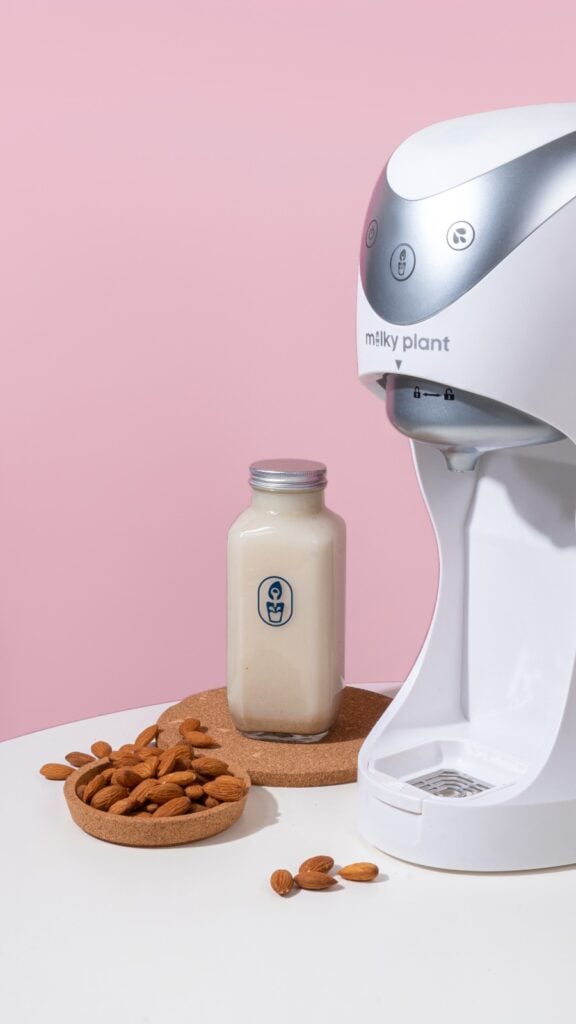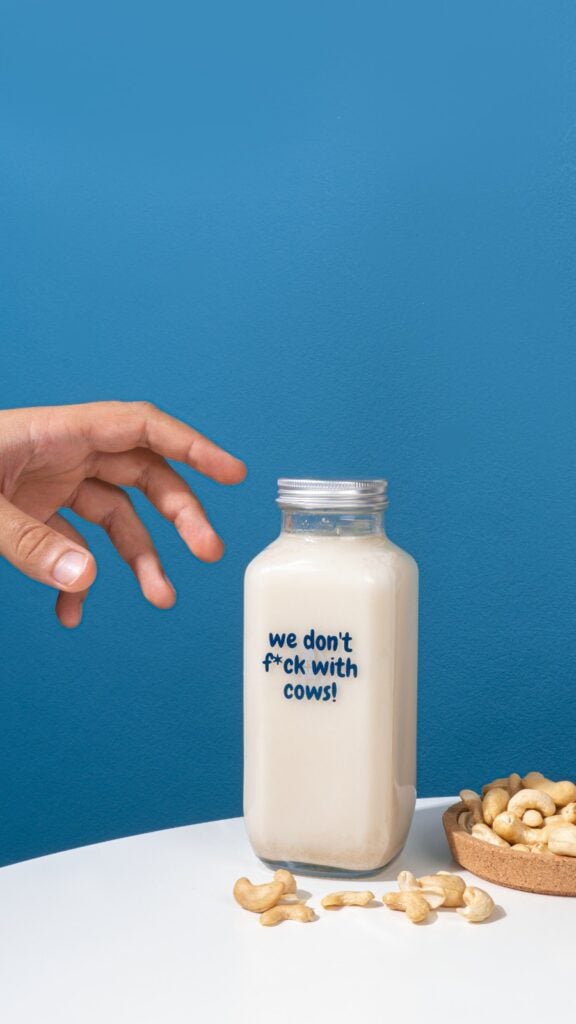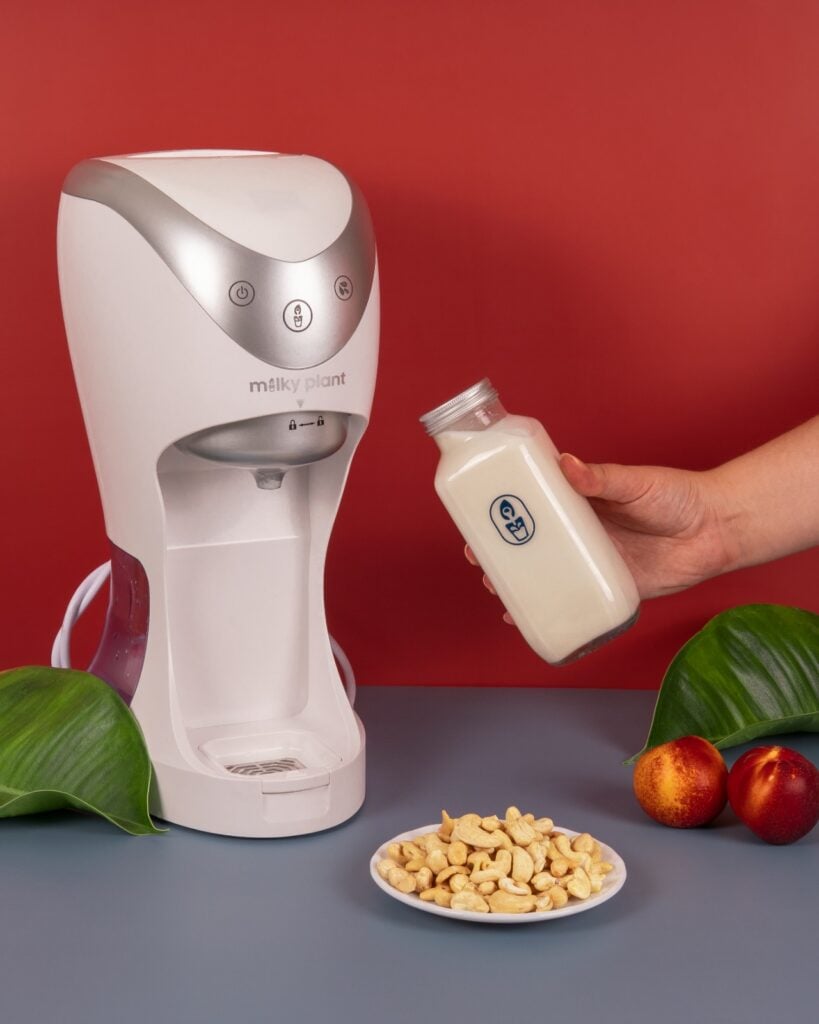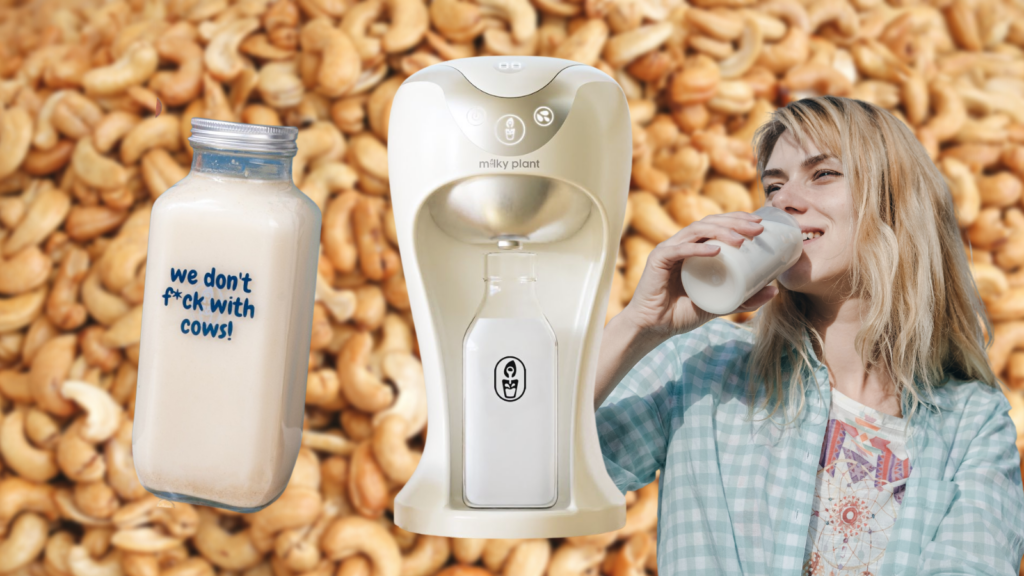🥛 This is a sponsored article * [what is this?]
Milky Plant, the all-in-one device making it easier to mix your own plant milk at home, is proving even more popular than expected as pre-orders skyrocket.
With a waitlist of 3,200 and counting, the duo behind Milky Plant—founders Nadina and Michael—have raised well over £340,000 to produce their “plant-based milk machine.”
By streamlining the plant milk-making process, they hope to encourage more people to try producing their own at home. In fact, the Milky Plant machine could potentially be the household appliance of the future; as ubiquitous in 2030 as toasters and microwave ovens.
With a sleek, white and chrome outer shell and a curved, top-heavy design, the Milky Plant device already looks the part. You simply add nuts, seeds, or plants of your choice, and with the push of a button, blend and pour a glass of milk in less than three minutes.
There are tons of different ideas and recipes for dairy-free milk out there, and you can even use the leftover pulp to make something else entirely. The Milky Plant means that you can choose exactly what you want to include, and with none of the harmful packaging of store-bought.
“You are in control of your ingredients. You know exactly what goes into your drink,” Nadina and Michael told Plant Based News.

Plant-based milk is the future
Milky Plant’s increasing sales represent both a growing global demand for dairy-free milk and an increasing environmental consciousness. For example, one third of UK British people now drink plant-based milk, with shoppers spending a huge £146 million on oat varieties in 2020.
In the US, plant-based milk has rapidly become a staple purchase for nearly half of all Americans, regardless of diet. Overall, people’s main motivations for choosing vegan milk over dairy are preserving the environment and improving personal health.
There are undoubtedly many benefits to drinking plant milk, from a radically reduced environmental footprint to lower consumption of saturated fat. (Let alone the fact that nearly 70 percent of the global population has trouble digesting the lactose found in dairy.)
But Milky Plant aims to make dairy-free milk even healthier and even more sustainable by removing all of the unnecessary packaging and preservatives that are still found in store-bought options. (Think various gums, oils, and sugars, for texture, flavor, and shelf life.)
“We were searching for a clean alternative for cows milk,” explained Nadina and Michael, talking about how they struggled to find what they were looking for in supermarkets. “But all the store options were filled with preservatives, seed oils, and emulsifiers. With Milky Plant, you are in control of your ingredients. You know exactly what goes into your drink.”

Plant-based food has a packaging problem
According to Milky Plant, the food industry produces nearly 500,000 tons of milk cartons and jugs every year, which can take hundreds of years to decompose if disposed of improperly.
Even if this type of packaging does eventually decompose in the natural environment, it contains microplastics, which are some of the most harmful and prevalent forms of plastic waste. (They can be found in water, air, our food, and as of this year, even human blood.)
In 2018, Tetra Pak reported the global recycling rate of its products as just 26 percent. This is because they typically contain a mixture of paper fibers, plastic, and sometimes aluminum, making them extremely difficult to process and recycle. Unfortunately, this means that 74 percent of all Tetra Paks are going to landfill, where they will take up to 450 years to rot.
“We noticed the amount of waste we were essentially creating from using all the tetra paks,” explained Nadina and Michael. Because of the low rate of recycling, avoiding this packaging, where possible, is invariably more efficient and sustainable than trying to process it after.
It’s in this way that the Milky Plant appliance is a simple but efficient solution to an extremely complicated and far-reaching problem. By simply removing the need for packaging, making plant milk at home means countless Tetra Paks are kept out of landfill and the natural world.

Transparency and the impact of Milky Plant
Producing technology such as the Milky Plant machine does come at a cost, but the company is dedicated to both transparency and sustainability throughout.
Production and distribution of one of Milky Plant’s signature appliances creates 50lbs of CO2, which the company highlights as the equivalent of approximately 30 glasses of dairy milk. (For context, the average American drinks this amount every 40 days!)
Milky Plant’s founders also plant five trees for every product sold to offset their impact even further, and Nadina and Michael are partnered with 1% For the Planet. They are also currently trialing an end-of-life recycling program to help fight the global issue of electronic waste.
“Once your machine is old we will arrange for it to be delivered to our facility. There, we will make sure that some of the parts will be reused and the ones that can’t will be recycled. The idea behind this is to prevent e-waste ending up in the landfill,” said Nadina and Michael.
At £260 per-item, the Milky Plant machine is undoubtedly a significant investment. But, according to Michael, the average customer will recoup their investment after just six months of the appliance’s 10-year-plus lifespan, going on to save £10-12 per week. If you only used the machine for 10 years and six months, that’s a saving of up to £6,240.
Milky Plant also estimates that the first 4,000 cups of milk made will prevent the production of more than 900 one-liter cartons—a huge win for the planet.
Get 10 percent off your very own Milky Plant appliance with the code PLANT10 right here. You can follow Milky Plant on Instagram here.
—
* This is paid-for content; funds from this article help Plant Based News continue to provide millions of people around the world with free content they know and love. We only work with brands we support and use ourselves.






